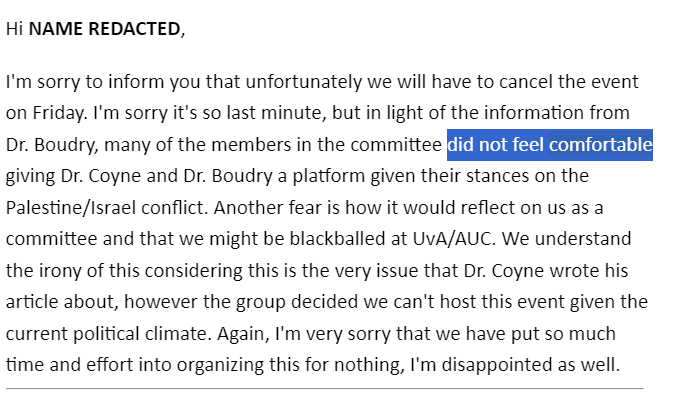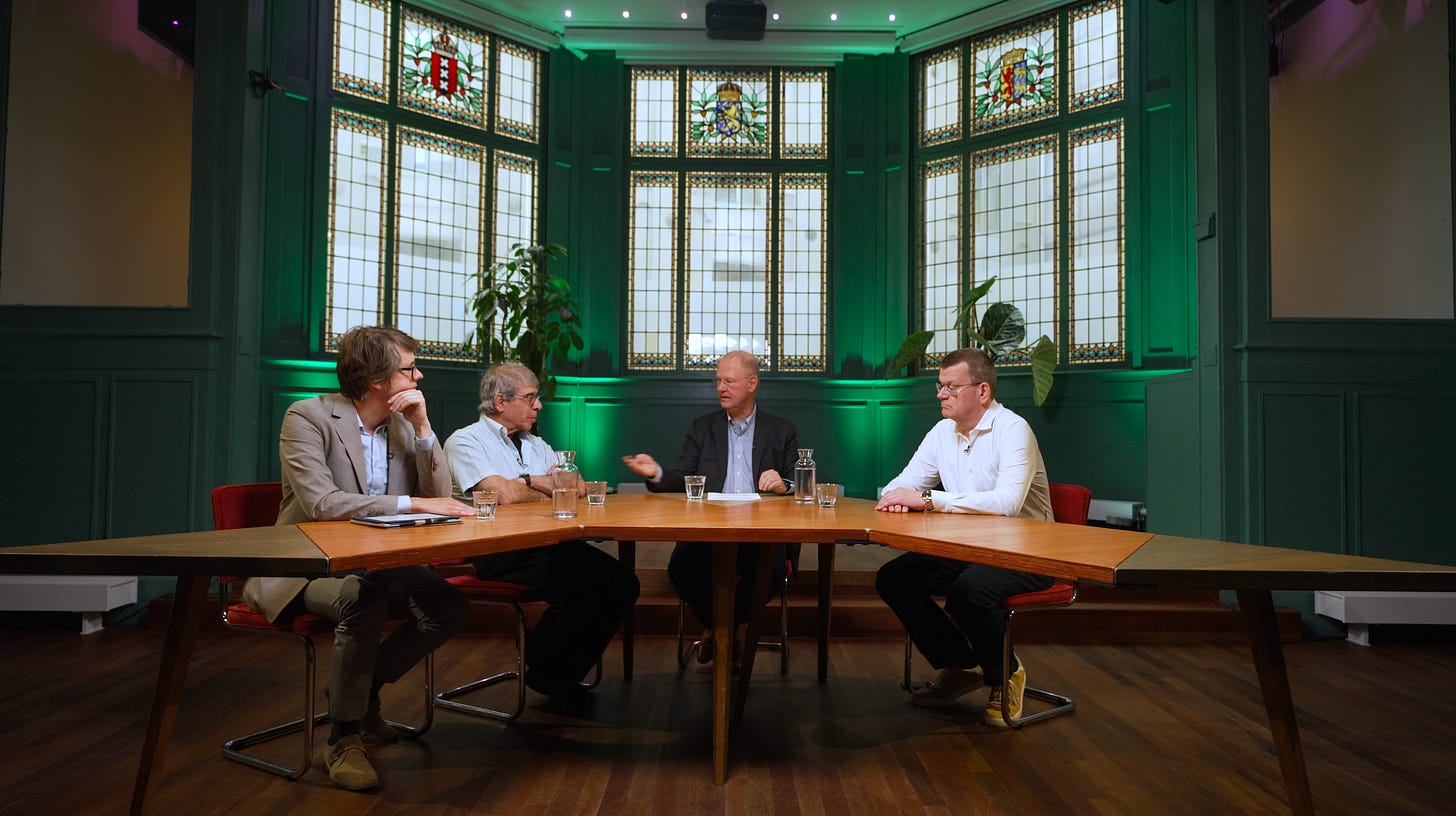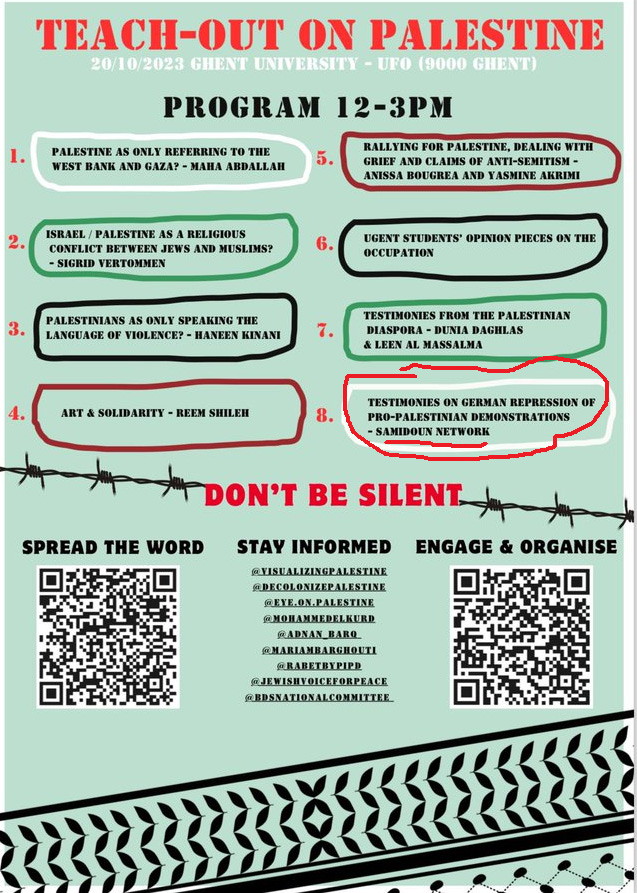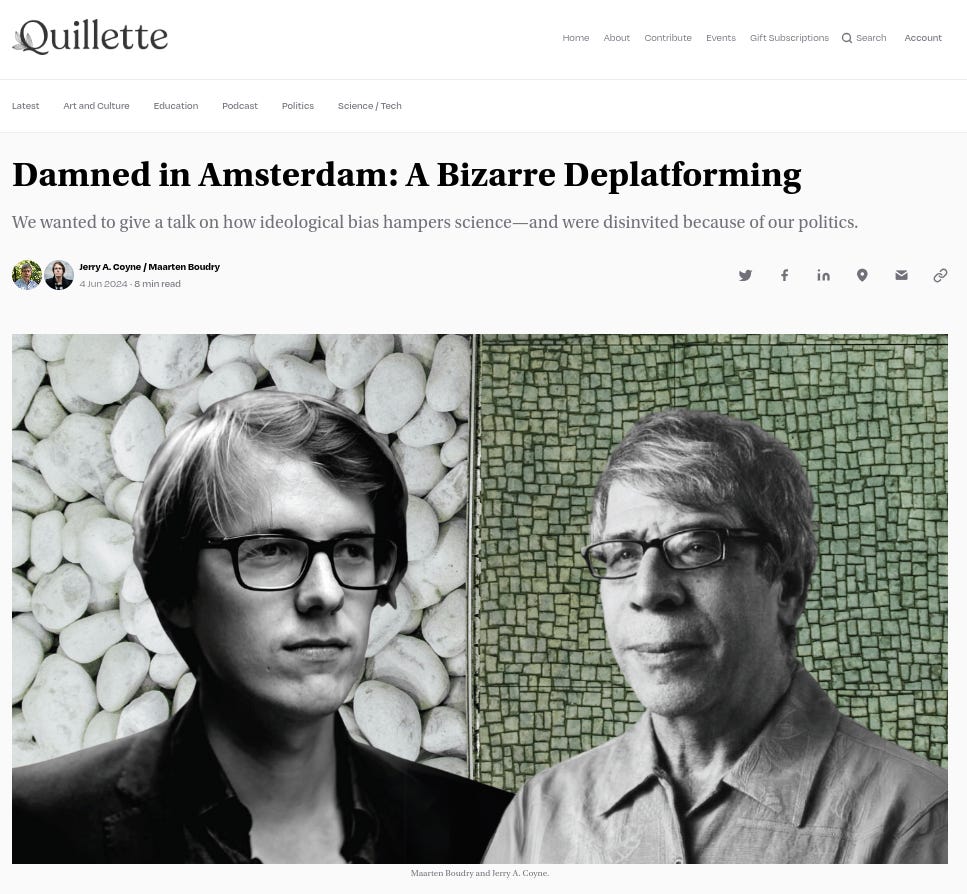The Ideological Subversion of Science
(Or how I was deplatformed twice at the University of Amsterdam)
Irony is dead: a debate at the University of Amsterdam (UvA) about ideological bias in science was cancelled at the last minute due to… the political views of the speakers (including me) about Israel.
Let's recap. In May, I was invited to give a guest lecture at the UvA on climate policy, only to be informed, upon disembarking from the train in Amsterdam, that the lecture could not take place on campus because of “security concerns”. Apparently that had to do with my position on Israel and the war in Gaza. The talk eventually took place online, from a colleague's private home 100 meters from the campus. In UvA’s defence, you could argue that they had just been overwhelmed by unexpected and violent student protests, and they might not have been able to quickly mobilise additional security. Perhaps a case of force majeure?
The following week, coincidentally, I was scheduled to participate in another event at UvA called “Politics in the Petri Dish”, together with my friend Jerry Coyne, an emeritus professor at the University of Chicago and author of the popular website Why Evolution is True. The topic? A trenchant article Jerry wrote in Skeptical Inquirer together with his colleague Luana Maroja about the incursion of ideology into science.
So what should I do? Not wanting to run the risk of ruining this event as well, this time we decided to give a heads-up to the organisers several days in advance, so that they could evaluate the situation and, if necessary, take measures.
In the worst case we had expected moving to a different location, or arranging extra security. Instead we were deplatformed for nakedly ideological reasons. A message from Betabreak, the organisers of the event, read: “Unfortunately we will have to cancel the event. Many members of our committee did not feel comfortable giving Dr. Coyne and Dr. Boudry a platform given their stances on the Palestine/Israel conflict. Another fear is how it would reflect on us and that we might be blackballed at University of Amsterdam or Amsterdam University College."
This time the organisers didn’t even bother to hide behind the threadbare excuse of "security concerns”, and openly admitted that they were only concerned about our views on Israel and how that would tarnish their own reputation. Once again, the topic of the event had absolutely nothing to do with Israel-Palestine. We were going to discuss creeping ideological bias in science, especially about sexuality and gender.
So long story short: our conversation about Jerry Coyne’s article was eventually recorded behind closed doors at a private location in Amsterdam, without an audience. It is now available on YouTube, and I think the video crew did a great job: Since Betabreak wasn’t planning to record the discussion, one unexpected benefit of being deplatformed is that we will now hopefully reach a much wider audience (an instance of the Streisand Effect).
I don’t want to shame BetaBreak itself, a group led by students in the STEM faculty. Much more disturbing is the social dynamic at play in the background, which the students from BetaBreak may have correctly sensed. They were not afraid of physical violence, but rather of exclusion and intimidation by fellow students or by the university itself. In a later official statement justifying the deplatforming, BetaBreak wrote that “Some speakers had very public positions that did not correspond with those of the demonstrators. Giving them a platform would further increase the already hostile and unsafe atmosphere on campus.”
In other words, only one orthodox position is being tolerated on the UvA campus, and that is the radical pro-Palestinian position that places all the blame for the current conflict on Israel, preferably with obscene accusations of “genocide”. Students and teachers who hold different views – and there are bound to be plenty – should keep their mouths shut. Even if you are critical of the Netanyahu government and its far-right cronies (as we are), the mere fact that you support Israel’s right to defend itself against a terrorist group places you beyond the pale. In stark contrast, extreme views at the opposite end of the spectrum (even pro-Hamas) seem to be perfectly acceptable at our universities. At my own University of Ghent, an organisation called Samidoun, which handed out pastries in Berlin on October 7 to celebrate Hamas’ massacre, was invited on campus at a “Teach-Out on Palestine” to speak about “German repression” (they have since been banned in Germany). Do you think any of these people ran the risk of being deplatformed or canceled because of “security concerns”?
I will publish an open letter against the academic boycott of Israel in a few days (already published in Dutch), co-signed by prominent academics such as Richard Dawkins, Fania Oz-Salzberger, Steven Pinker, Jonathan Haidt and (of course) Jerry Coyne, but I can’t tell you how many times I received a reply from a colleague along the lines of: “I fully agree with the substance of your letter, but I would rather not sign it, because I don’t want to get in trouble.” This is the “trouble” you get into: being blackballed and deplatformed at universities.
A university should facilitate maximum viewpoint diversity on contentious issues such as this one: from staunchly pro-Israeli (even more radical than my own moderate position) to fervently pro-Palestinian, with everything in between. In recent years, however, we see worrying signs that an open discussion on this topic (and also on sexuality and gender, or the heredity of IQ, or the negative consequences of migration) is no longer possible at our universities. Although it had no direct link to the Israeli-Palestinian conflict, the article by Jerry Coyne was meant exactly to push back against this ideological undermining of science and of academic institutions.
When academics complain about the declining trust in science (especially among conservatives and Republicans), they should shoulder some of the blame. If ideological zealots impose their views on the rest of academia, they will only further erode trust in science.
In any event, I wrote a piece in Quillette together with Jerry about our deplatforming experience. I’m allowed to post the first three paragraphs (see below), but for the full piece you’ll need to visit the Quillette website. For now, this piece is free, but it will be paywalled in a few days. You can support Quillette—a bastion of free thought in my view—by becoming a subscriber.
Or you can subscribe here of course, at my own little bastion of free speech! 😉
Damned in Amsterdam: A Bizarre Deplatforming
We wanted to give a talk on how ideological bias hampers science—and were disinvited because of our politics.
Jerry A. Coyne & Maarten Boudry
Like being struck by lightning, getting deplatformed—first invited to speak and then disinvited for your political views—is something you assume happens only to other people. But, unlike a lightning strike, it’s not a rare occurrence. The Foundation for Individual Rights and Expression (FIRE)’s “campus deplatforming database” of US universities lists 626 successful deplatforming attempts since 1998. This year alone, there have already been 110 attempts to cancel talks, most involving speakers sympathetic to Israel. Neither of us, however, had ever personally experienced this kind of cancellation before.
One of the curious features of disinvitation is that the deplatformee’s supposedly offensive views are often irrelevant to the topic they were asked to talk about. A notable example involved our University of Chicago colleague, the geophysicist Dorian Abbot, who was invited to give a prestigious talk at MIT in 2021. After the social media Pecksniffs discovered that Abbot had been critical of DEI (Diversity, Equity, and Inclusion), championing merit-based evaluation in its place, the MIT administration cancelled his talk—even though the talk was about global warming and made no mention of DEI at all.
You might think, with its more liberal climate, Western Europe would be more tolerant of diverse views and less quick to condemn speakers for their political viewpoints. You would be wrong. A student group called “BetaBreak” at the University of Amsterdam (UvA) had invited us both, along with Michael Richardson, a biologist from Leiden, to discuss a provocative paper written by Coyne and Luana Maroja on the incursion of ideology into science. Our invitation was rescinded after the organisers discovered that Boudry and Coyne had what were deemed unacceptable stances on the conflict between Hamas and Israel.
[…]
Read the rest of the article at Quillette.








This is so wild!!!!! Your take is so completely nuanced too, I don’t get why we are only allowed to have radical viewpoints now. 😩
I disagree with you completely on Israel, a nation I believe to be embarked upon a project of ethnic cleansing. However, this deplatforming is appalling and reflects very very poorly on U Amsterdam.